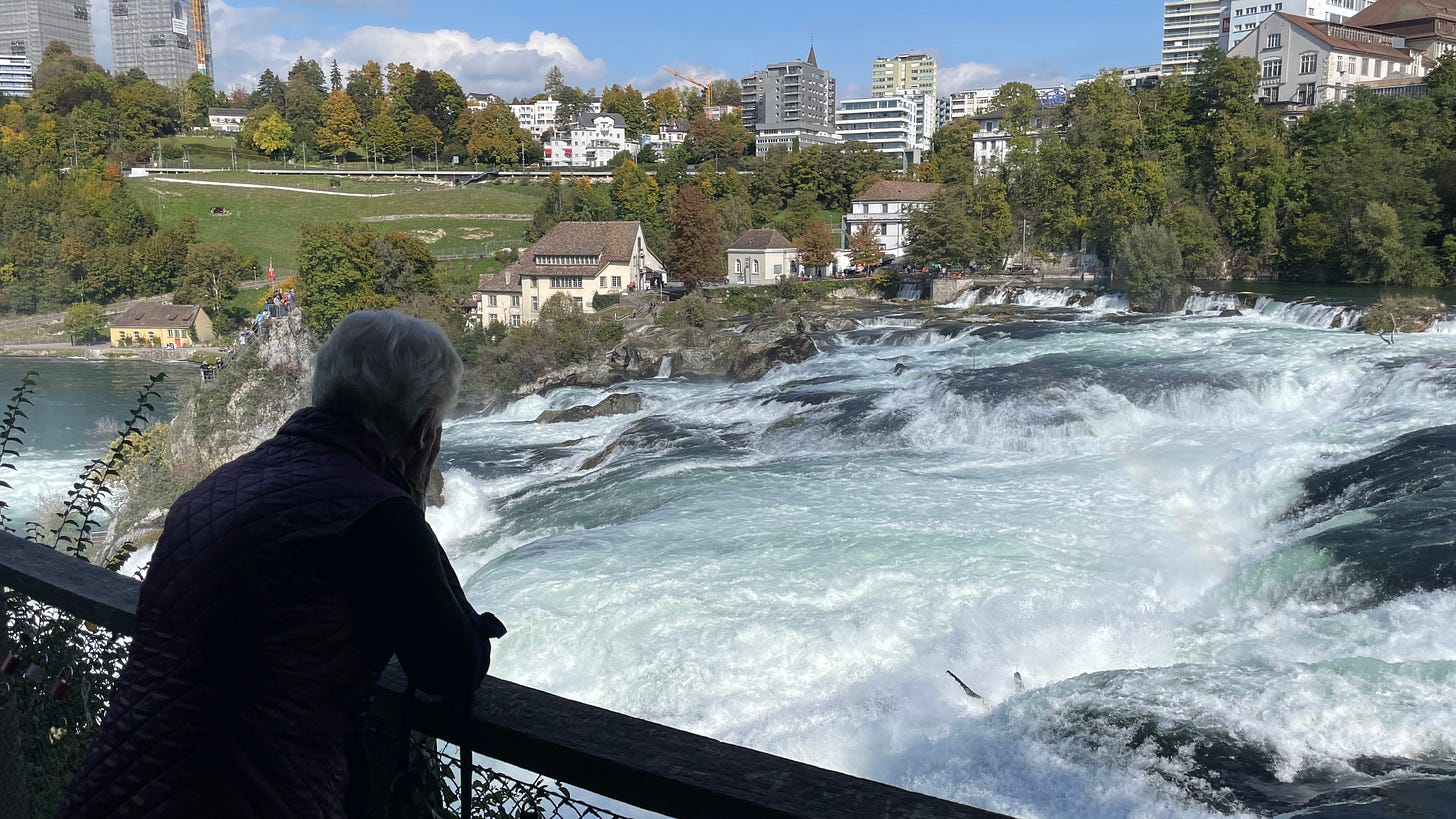Welcome back (or welcome)!
Sometimes life looms large. Listening to coworkers and friends and people in my feeds, there is death and illness and uncertainty. (There is also some honest delight).
Like Rheinfall in Switzerland, there are so many currents and rocks and stories.
I don’t have answers today. But I do have some thinking.
Jeff, a reader and supporter here, whose questions and comments have informed some of this writing, is a firefighter in LA. Every time I see the fire gear, I know it could be him.
Last week it was him. I didn’t see him, actually, but I saw one of the fires he worked. You probably did, too. I’ve been asking God to guide and protect him in his work and in his care for coworkers. Because part of what he does is care about the team around him.
+++
Wendee is another reader and supporter. She’s an artist and a teacher and a coach. The Art Center, which she’s been part of, is close to a couple of the fires. And faculty and staff and students lived close and have lost homes. (Here’s her update on 1/16/2025.)
Responding to her note to me, I wrote, “It is going to be so hard. There is so much personal grief, and subcommunity grief, and the national and media attention will burn as bright and as fast as the fire and then leave nothing but good intentions like ashes.”
Because as a people of scrollers, we will scroll past these fires.
+++
The other day, Nancy wrote this on Facebook:
When I was 6 years old, our family moved into this house. The picture is much older than that, but it did look quite similar. 6 months later, it burned to the ground. Fortunately, many items from inside were saved, and our neighbors provided a place for us to live for several months. I remember going to school a couple of days after the fire, and during “show and tell”, talking about the fire and losing my school shoes. I wasn’t aware of how difficult this was for my parents.
Today, as I watch the news of the fires in California, I am heartbroken for the families who have lost everything. Completely homeless. Complete devastation. It is just so hard.
Other friends responded with stories of their own house fires. The scrollers scroll, but the images linger for 6-year-olds.
+++
Over and over, the research on bereavement care points to this: the most helpful support for 60% of grieving people comes from friends and family.1 Which is why I work to help people like you have resources to be helpful.
When your house is ashes and your neighborhood is scattered and your school isn’t there and your grocery, with all the informal connections, is gone, it’s hard to find family and friends to give support. Which is why, if you have a connection, if you are a friend or a family member, your help matters.
(This disruption happens all around the world. There is loss of life and communities of support all the time.)
I don’t have answers. All this is hard.
I do have some suggestions for helping people you know who are going through big things.
Remember. For days and months, remember the disruption. A house fire, an accident, an illness, a death, all of these in various ways change lives. And when we remember what our friend is remembering, we’ll have patience and presence when they suddenly are silent.
Resist - the temptation to say “at least” or “but look what could happen”. The person in the middle of a loss gets to say that, not the person who is watching, and in a related point, '
Refrain from spreading theories and stories and explanations that aren’t going to help the actual students who lost their homes.
Reach. In the ways that make the most sense in your relationship, reach out. With words, with shovels, with relationships that may be helpful.
Refer. Know helpful resources and refer people to them. Just this week, I found a site that tells how to find government-related resources after a death, like social security and Medicare and the VA. I saved the link. I get the question a couple times a month.
+++
That’s what I’ve got this week.
Remember, resist, refrain, reach, refer.
I’m not as good at all this as I wish. That’s why I’m trying to help you.
See you next time.
Jon
About 60% of people whose loved one has died are helped most by friends and family. About 30% need support that’s a little more trained. And about 10% need the kind of help that professionals provide.






Thank you, Jon, for sharing my post and your care around what we are currently experiencing. I also appreciate that your words for these hard times (I had thought to ask if you had some). I'm also sorry for Nancy's loss. I'm grateful for your friendship and the support means so much to me!